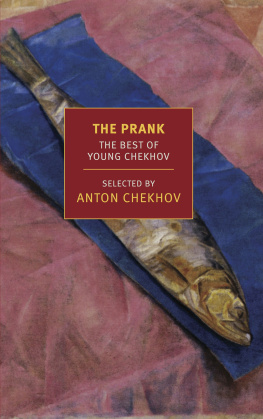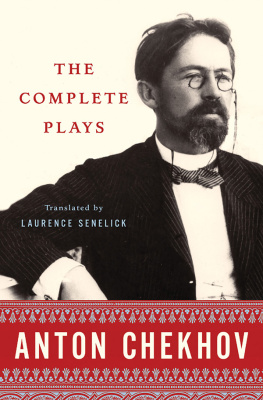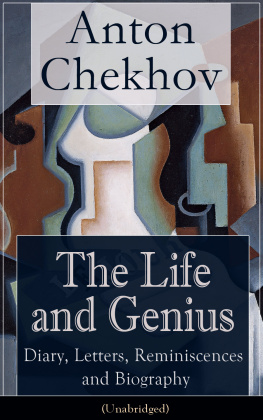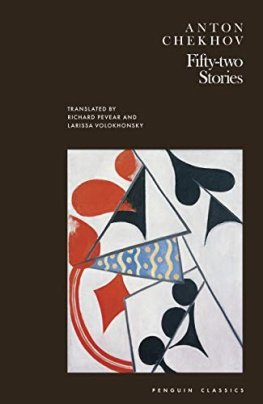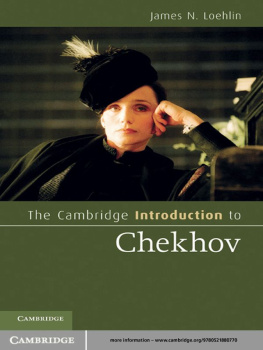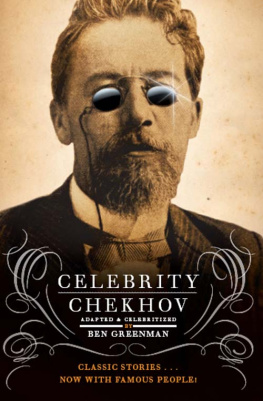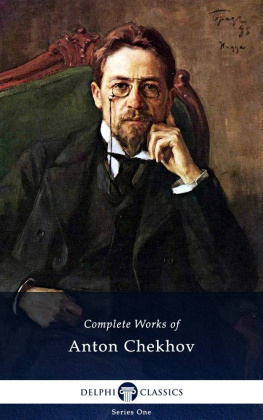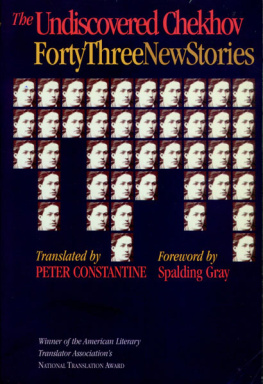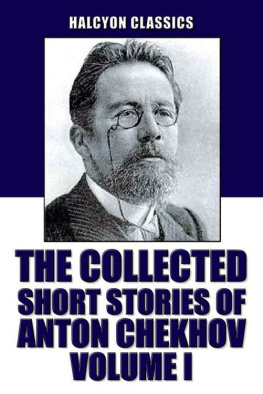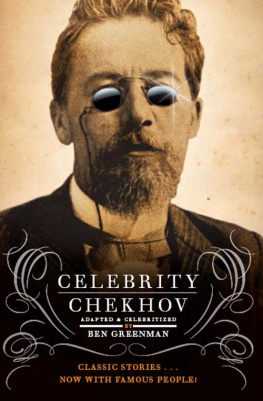ANTON CHEKHOV (18601904), the son of a grocer and a former serf, worked as a physician and ran an open clinic for the poor, while also writing the plays and short stories that have established him as one of the greatest figures in Russian literature.
MARIA BLOSHTEYN is a translator and scholar of Russian and American literature. She lives in Toronto.
NIKOLAY CHEKHOV (18581889), older brother of Anton, studied art at the Moscow School of Painting, Sculpture and Architecture. His drawings frequently accompanied his brothers early published stories. Although considered the most promising of the three Chekhov brothers in his youth, Nikolays alcoholism and habit of sleeping in the streets precipitated his death from tuberculosis at the age of thirty-one.
THE PRANK
The Best of Young Chekhov
ANTON CHEKHOV
Translated from the Russian and with an introduction by
MARIA BLOSHTEYN
Illustrated by
NIKOLAY CHEKHOV
NEW YORK REVIEW BOOKS

New York
THIS IS A NEW YORK REVIEW BOOK
PUBLISHED BY THE NEW YORK REVIEW OF BOOKS
435 Hudson Street, New York, NY 10014
www.nyrb.com
Copyright 2015 by NYREV, Inc.
Translation, introduction, and notes copyright 2015 by Maria Bloshteyn
All rights reserved.
The publisher would like to thank Peter B. Kaufman for his assistance in the preparation of this volume.
Cover illustration: Kuzma Petrov-Vodkin, Herring, 1918, State Russian Museum, St. Petersburg/Bridgeman Images
Cover design: Katy Homans
Library of Congress Cataloging-in-Publication Data
Chekhov, Anton Pavlovich, 18601904, author.
[Short stories. Selections. English. (Bloshteyn)]
The prank : the best of young Chekhov / by Anton Chekhov ; illustrated by Nikolay Chekhov ; translation and introduction by Maria Bloshteyn.
pages : illustrations ; cm. (New York Review Books classics)
ISBN 978-1-59017-836-2 (alk. paper)
I. Bloshteyn, Maria R., 1971 translator. II. Chekhov, Nikolai, 18581889,
illustrator. III. Title. IV. Series: New York Review Books classics.
PG3456.A13B58 2015
891.73'3dc23
2014046121
ISBN 978-1-59017-837-9
v1.0
For a complete list of books in the NYRB Classics series, visit www.nyrb.com or write to:
Catalog Requests, NYRB, 435 Hudson Street, New York, NY 10014
CONTENTS
INTRODUCTION
C HEKHOV assembled the stories in The Prank in 1882. He was twenty-two years old and hoped the book would launch him on a literary career. As it happened, it didnt come out that year or during his lifetime. It appears here, more than 130 years later, for the first time, and in English translation to boot. Chekhov, who declared that he would be read for at most a year after his death and who told a translator that his works could be of no possible interest to the English-reading public, would surely have been pleasantly surprised.
Chekhov was in medical school in Moscow when, in 1880, he began to write and publish humorous stories and satirical sketches in popular magazines and weekly journals. He wrote to support himself and his impoverished family, and he was extraordinarily prolific. He had to be. He was paid five kopecks a linenot too shabby, considering that a loaf of bread cost three kopecksbut then his entire family (father, mother, and five siblings) also depended on the extra money. The familys home was a musty cellar in Moscows red-light district and they wanted out; there was also the question of his younger siblings education.
Between 1880 and 1882, Chekhov published more than sixty stories, sketches, and vignettes in Moscow and St. Petersburg journals under various pseudonyms, most of them a variation on Antosha Chekhonte (a nickname given to him by one of his teachers back in Taganrog). He wrote quickly, regularly, topically, andmost of allconcisely. The humor magazines where he published, such as The Alarm Clock (Budil'nik), The Spectator (Zritel'), and The Dragonfly (Strekoza), which were often sold at train stations, were aimed at bored urban readers with short attention spans. Anecdotes, jokes, one-liners, gossip, and caricatures crammed their pages. There was little space for lengthier stories or pieces. This was excellent training for a young writer, as Ivan Bunina sometime protg of Chekhovs and later the first Russian recipient of the Nobel Prize in Literaturewould remark.
For the young Chekhov writing was a way to eke out a living, but it was a pleasure too. (Famously, he compared medicine to a lawful wife and literature to an alluring mistress.) The zest with which he went at it is evident from the invention, energy, and wit of his early stories. A decade later, in a letter to Victor Bilibin, a friend who had also published in the humor magazines, Chekhov remarked that in rereading their old contributions, he was struck by the enthusiasm which was so much a part of you and me and which none of the newfangled geniuses have. Collections of comic stories were selling well (they provided a welcome distraction from the not so funny realities of Russian life at the time) and there was every indication that the book would bring the brothers the attention they clearly craved (witness a studio photograph from 1882 that shows Anton standing at a desk, surrounded by books and papers, while gazing down at Nikolay, who is hard at work on a drawing).
But the book never came out. Why? For many years it remained a mystery, as did the title and exact contents of the proposed collection. The answer, eventually discovered by the scholar Mikhail Gromov while researching the early stories in the first half of the 1970s, lay in the archives of the czarist office of censorship in Moscow.
The assassination of Alexander II on March 13, 1881, had been followed by a massive political clampdown. All forms of publication were subjected to harsh censorship, humorous journals, no matter how mild and toothless, as much as critical and political ones. Konstantin Pobedonostsev, the grim chief procurator of the Most Holy Synod, wrote to Alexander III that there could be no order in the land while newspapers and magazines had uncurbed freedom for gossip, chatter, and rabblerousing. And this was in St. Petersburg, where censorship was comparatively relaxed. In Moscow, at a distance from the seat of government and so requiring that much more supervision, the situation was much worse.
Moscow, however, was both where the Chekhovs lived and where the cheap printers were located, and so, accordingly, was where the Chekhov brothers turned to publish their book. Moscow, then, was where the book would have to clear the censor. The first step in this process required the author to have the book typeset and then put in a preliminary application to have the censor read it. Early in the summer of 1882, Chekhov submitted this preliminary application for a book entitled Good-for-Nothings and Good-Sorts (Shalopai i blagodushnye) through the printer and publisher Nikolay Skodi, to whose magazine, The Spectator, both he and Nikolay were frequent contributors. Permission was denied on a technicality. Chekhov submitted a new application. The book was now to be called The Prank. As part of the new application, Chekhov pointed out that all the stories, except for one, had been cleared by the censor for previous publication in journals and promised to send a manuscript version of the one exception.
This time, the preliminary application passed. Chekhovs typeset book was assigned to be read by V. Ia. Fedorov, a stern censor and influential bureaucrat, who became the chairman of the Moscow censorship committee later that year,

